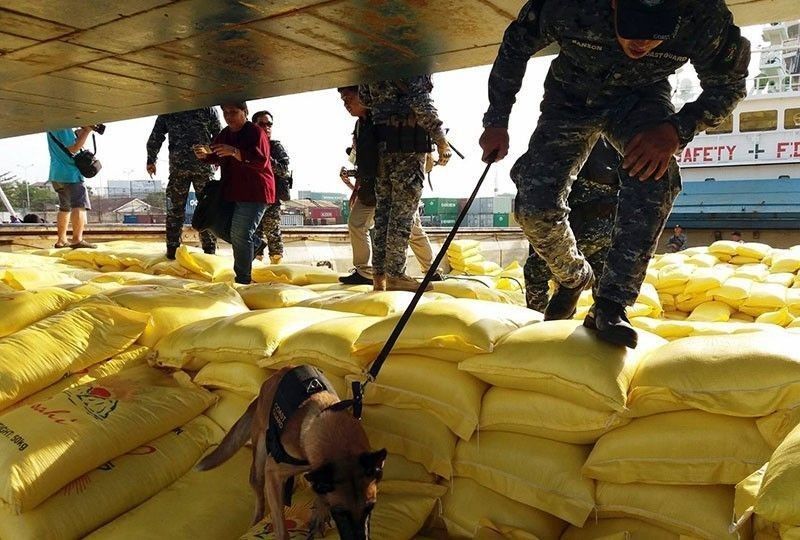House probes rice cartels, smuggling

MANILA, Philippines — The House of Representatives will look into reports of rampant rice smuggling and the existence of cartels that control the procurement, importation and sale of the basic staple.
House Resolution No. 332, filed by party-list group Magsasaka, prompted the investigation.
Other groups belonging to the leftist Makabayan bloc proposed the passage of a supplemental budget of P15 billion to help farmers affected by low palay prices.
The proposal, contained in a resolution, followed the filing of a similar measure by House members belonging to the Liberal Party for the allocation of available funds amounting to P13 billion for farmers.
Assistant minority leader Magsasaka Rep. Argel Joseph Cabatbat told the weekly Party-list Coalition forum yesterday that despite the unregulated importation of rice under a new law, cartels continue to smuggle the staple.
“Rice smuggling and cartels do not only deny the government of revenue but also put poor Filipino families on the edge of hunger and poverty,” Cabatbat said.
He said the law liberalizing rice importation provided that imports are levied a 35-percent tariff, but this has not benefited consumers and farmers.
“Rice prices remain high, while palay prices have fallen to record lows,” he said.
Cabatbat said the House would begin its inquiry after passing the proposed P4.1-trillion national budget for 2020.
“Imported rice entering the country through legal and illegal means continue to flood the local market, depriving the government of billions in taxes and killing our rice farmers as well,” he said.
He said cartels and traders control the sale of imported rice in the market to keep prices high, while offering low prices for the farmers’ palay produce.
P15-billion supplemental budget for NFA
Under the Makabayan resolution, the P15 billion would be given to the National Food Authority (NFA) to enable the agency to buy palay at P20 a kilo and sell the same as rice at P27 to prop up the price of palay and force down retail prices of rice.
The Liberal Party version would authorize the government to use P13 billion for cash grants to farmers.
The supplemental fund for the NFA being pushed by lawmakers will help the agency procure at least 750,000 metric tons of palay from local farmers, NFA administrator Judy Dansal said.
“It will favor the NFA if that will be granted,” Dansal said. “We can buy more volume of palay and serve more farmers.”
Local farmgate prices of palay have been dropping since the implementation of the Rice Tariffication law in March.
Based on figures from the Philippine Statistics Authority (PSA), the average price of palay fell 4.4 percent to P16.68 per kilo as of end-August.
Agriculture Secretary William Dar echoed Dansal’s sentiments, saying the additional P15-billion budget would help with the procurement of palay from local farmers.
“This will help the NFA buy more palay,” he said.
Palay price up
Farmers said the Department of Agriculture (DA) should ensure that palay prices would not go down further when it releases large volume of rice in the market.
Dar announced that the DA would bring down rice prices to P27 per kilo by flooding the market with 3.6 million bags of rice and increase palay price to P19 from P17 per kilo for clean and dry.
The NFA set Oct. 10 as a deadline to dispose of the 3.6 million sacks of rice in its warehouses.
“It took the DA almost a month before deciding to release the rice that is equivalent to 10 days of stock. Since farmers will harvest early this September-October, the DA might use it as an excuse not to buy palay from farmers,” Kilusang Magbubukid ng Pilipinas chairman Danilo Ramos said.
With the higher buying price for palay, the NFA removed the add-on incentive payments to farmers.
Chona Maramba, NFA Western Pangasinan assistant manager, said the agency would buy dry and clean palay at a higher price of P19 per kilo, but the cash incentive would be dropped.
She said the production cost of palay is around P12 per kilo and with the new buying price, farmers will earn P7 compared to P5.
The old incentive scheme includes payment of P3 per kilo as buffer stock fee, P0.20 for drying, P0.20 for delivery and additional P0.30 as cooperative development fee for qualified recipients.
Cash grants
Deputy Speakers Mikee Romero of 1-Pacman and Mujiv Hataman of Basilan proposed that rice farmers be included in the government’s cash transfer program.
Romero said the cash assistance would allow farmers suffering from low palay prices to recoup part of their losses.
He said billions in revenues from rice imports could be used to beef up funding for the program.
Last week, the NFA Council agreed to fix the buying price for clean and dry palay with 14 percent moisture content at P19 per kilo and wet palay with 30 percent moisture content at P14 per kilo.
It is one of two measures approved by the council to cut down the retail prices of rice and sustain its local palay-buying operations.
The NFA Council also resolved to flood Metro Manila and other markets nationwide with 3.6 million 50-kilogram bags of rice, making up NFA’s old imported stocks valued at P4.86 billion. Proceeds from the sale of old stocks can be used to procure palay from farmers. – With Catherine Talavera, Rhodina Villanueva, Eva Visperas
- Latest
- Trending
































